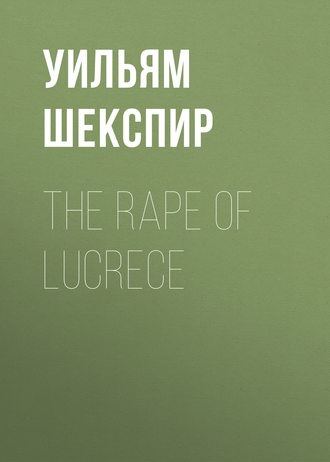полная версия

Уильям Шекспир
The Rape of Lucrece
'So let thy thoughts, low vassals to thy state' —
'No more,' quoth he; 'by heaven, I will not hear thee:
Yield to my love; if not, enforced hate,
Instead of love's coy touch, shall rudely tear thee;
That done, despitefully I mean to bear thee
Unto the base bed of some rascal groom,
To be thy partner in this shameful doom.'
This said, he sets his foot upon the light,
For light and lust are deadly enemies;
Shame folded up in blind concealing night,
When most unseen, then most doth tyrannize.
The wolf hath seiz'd his prey, the poor lamb cries;
Till with her own white fleece her voice controll'd
Entombs her outcry in her lips' sweet fold:
For with the nightly linen that she wears
He pens her piteous clamours in her head;
Cooling his hot face in the chastest tears
That ever modest eyes with sorrow shed.
O, that prone lust should stain so pure a bed!
The spots whereof could weeping purify,
Her tears should drop on them perpetually.
But she hath lost a dearer thing than life,
And he hath won what he would lose again.
This forced league doth force a further strife;
This momentary joy breeds months of pain,
This hot desire converts to cold disdain:
Pure Chastity is rifled of her store,
And Lust, the thief, far poorer than before.
Look, as the full-fed hound or gorged hawk,
Unapt for tender smell or speedy flight,
Make slow pursuit, or altogether balk
The prey wherein by nature they delight;
So surfeit-taking Tarquin fares this night:
His taste delicious, in digestion souring,
Devours his will, that liv'd by foul devouring.
O deeper sin than bottomless conceit
Can comprehend in still imagination!
Drunken desire must vomit his receipt,
Ere he can see his own abomination.
While lust is in his pride no exclamation
Can curb his heat, or rein his rash desire,
Till, like a jade, self-will himself doth tire.
And then with lank and lean discolour'd cheek,
With heavy eye, knit brow, and strengthless pace,
Feeble desire, all recreant, poor, and meek,
Like to a bankrupt beggar wails his case:
The flesh being proud, desire doth fight with Grace,
For there it revels; and when that decays,
The guilty rebel for remission prays.
So fares it with this faultful lord of Rome,
Who this accomplishment so hotly chas'd;
For now against himself he sounds this doom,
That through the length of times he stands disgrac'd:
Besides, his soul's fair temple is defac'd;
To whose weak ruins muster troops of cares,
To ask the spotted princess how she fares.
She says, her subjects with foul insurrection
Have batter'd down her consecrated wall,
And by their mortal fault brought in subjection
Her immortality, and made her thrall
To living death, and pain perpetual;
Which in her prescience she controlled still,
But her foresight could not forestall their will.
Even in this thought through the dark night he stealeth,
A captive victor that hath lost in gain;
Bearing away the wound that nothing healeth,
The scar that will, despite of cure, remain;
Leaving his spoil perplex'd in greater pain.
She hears the load of lust he left behind,
And he the burthen of a guilty mind.
He like a thievish dog creeps sadly thence;
She like a wearied lamb lies panting there;
He scowls, and hates himself for his offence;
She, desperate, with her nails her flesh doth tear;
He faintly flies, sweating with guilty fear;
She stays, exclaiming on the direful night;
He runs, and chides his vanish'd, loath'd delight.
He thence departs a heavy convertite;
She there remains a hopeless castaway:
He in his speed looks for the morning light;
She prays she never may behold the day;
'For day,' quoth she, 'night's scapes doth open lay;
And my true eyes have never practis'd how
To cloak offences with a cunning brow.
'They think not but that every eye can see
The same disgrace which they themselves behold;
And therefore would they still in darkness be,
To have their unseen sin remain untold;
For they their guilt with weeping will unfold,
And grave, like water that doth eat in steel,
Upon my cheeks what helpless shame I feel.'
Here she exclaims against repose and rest,
And bids her eyes hereafter still be blind.
She wakes her heart by beating on her breast,
And bids it leap from thence, where it may find
Some purer chest, to close so pure a mind.
Frantic with grief thus breathes she forth her spite
Against the unseen secrecy of night:
'O comfort-killing night, image of hell!
Dim register and notary of shame!
Black stage for tragedies and murders fell!
Vast sin-concealing chaos! nurse of blame!
Blind muffled bawd! dark harbour for defame!
Grim cave of death, whispering conspirator
With close-tongued treason and the ravisher!
'O hateful, vaporous, and foggy night!
Since thou art guilty of my cureless crime,
Muster thy mists to meet the eastern light,
Make war against proportion'd course of time!
Or if thou wilt permit the sun to climb
His wonted height, yet ere he go to bed,
Knit poisonous clouds about his golden head.
'With rotten damps ravish the morning air;
Let their exhal'd unwholesome breaths make sick
The life of purity, the supreme fair,
Ere he arrive his weary noontide prick;
And let thy misty vapours march so thick,
That in their smoky ranks his smother'd light
May set at noon and make perpetual night.
'Were Tarquin night (as he is but night's child),
The silver-shining queen he would distain;
Her twinkling handmaids too, by him defil'd,
Through Night's black bosom should not peep again:
So should I have co-partners in my pain:
And fellowship in woe doth woe assuage,
As palmers' chat makes short their pilgrimage.
'Where now I have no one to blush with me,
To cross their arms and hang their heads with mine,
To mask their brows, and hide their infamy;
But I alone alone must sit and pine,
Seasoning the earth with showers of silver brine,
Mingling my talk with tears, my grief with groans,
Poor wasting monuments of lasting moans.
'O night, thou furnace of foul-reeking smoke,
Let not the jealous day behold that face
Which underneath thy black all-hiding cloak
Immodesty lies martyr'd with disgrace!
Keep still possession of thy gloomy place,
That all the faults which in thy reign are made,
May likewise be sepulchred in thy shade!
'Make me not object to the tell-tale day!
The light will show, character'd in my brow,
The story of sweet chastity's decay,
The impious breach of holy wedlock vow:
Yea, the illiterate, that know not how
To cipher what is writ in learned books,
Will quote my loathsome trespass in my looks.
'The nurse, to still her child, will tell my story
And fright her crying babe with Tarquin's name;
The orator, to deck his oratory,
Will couple my reproach to Tarquin's shame:
Feast-finding minstrels, tuning my defame,
Will tie the hearers to attend each line,
How Tarquin wronged me, I Collatine.
'Let my good name, that senseless reputation,
For Collatine's dear love be kept unspotted:
If that be made a theme for disputation,
The branches of another root are rotted,
And undeserved reproach to him allotted,
That is as clear from this attaint of mine
As I, ere this, was pure to Collatine.
'O unseen shame! invisible disgrace!
O unfelt sore! crest-wounding, private scar!
Reproach is stamp'd in Collatinus' face,
And Tarquin's eye may read the mot afar,
How he in peace is wounded, not in war.
Alas, how many bear such shameful blows,
Which not themselves, but he that gives them knows!
'If, Collatine, thine honour lay in me,
From me by strong assault it is bereft.
My honey lost, and I, a drone-like bee,
Have no perfection of my summer left,
But robb'd and ransack'd by injurious theft:
In thy weak hive a wandering wasp hath crept,
And suck'd the honey which thy chaste bee kept.
'Yet am I guilty of thy honour's wrack; —
Yet for thy honour did I entertain him;
Coming from thee, I could not put him back,
For it had been dishonour to disdain him:
Besides, of weariness he did complain him,
And talk'd of virtue: – O unlook'd-for evil,
When virtue is profan'd in such a devil!
'Why should the worm intrude the maiden bud?
Or hateful cuckoos hatch in sparrows' nests?
Or toads infect fair founts with venom mud?
Or tyrant folly lurk in gentle breasts?
Or kings be breakers of their own behests?
But no perfection is so absolute,
That some impurity doth not pollute.
'The aged man that coffers up his gold
Is plagued with cramps, and gouts, and painful fits;
And scarce hath eyes his treasure to behold,
But like still-pining Tantalus he sits,
And useless barns the harvest of his wits;
Having no other pleasure of his gain
But torment that it cannot cure his pain.
'So then he hath it when he cannot use it,
And leaves it to be master'd by his young;
Who in their pride do presently abuse it:
Their father was too weak, and they too strong,
To hold their cursed-blessed fortune long.
The sweets we wish for turn to loathed sours,
Even in the moment that we call them ours.
'Unruly blasts wait on the tender spring;
Unwholesome weeds take root with precious flowers;
The adder hisses where the sweet birds sing;
What virtue breeds iniquity devours:
We have no good that we can say is ours,
But ill-annexed Opportunity
Or kills his life or else his quality.
'O Opportunity, thy guilt is great:
'Tis thou that executest the traitor's treason;
Thou set'st the wolf where he the lamb may get;
Whoever plots the sin, thou 'point'st the season;
'Tis thou that spurn'st at right, at law, at reason;
And in thy shady cell, where none may spy him,
Sits Sin, to seize the souls that wander by him.
'Thou mak'st the vestal violate her oath;
Thou blow'st the fire when temperance is thaw'd;
Thou smother'st honesty, thou murther'st troth;
Thou foul abettor! thou notorious bawd!
Thou plantest scandal and displacest laud:
Thou ravisher, thou traitor, thou false thief,
Thy honey turns to gall, thy joy to grief!
'Thy secret pleasure turns to open shame,
Thy private feasting to a public fast;
Thy smoothing titles to a ragged name,
Thy sugar'd tongue to bitter wormwood taste:
Thy violent vanities can never last.
How comes it then, vile Opportunity,
Being so bad, such numbers seek for thee?
'When wilt thou be the humble suppliant's friend,
And bring him where his suit may be obtain'd?
When wilt thou sort an hour great strifes to end?
Or free that soul which wretchedness hath chain'd?
Give physic to the sick, ease to the pain'd?
The poor, lame, blind, halt, creep, cry out for thee;
But they ne'er meet with Opportunity.
'The patient dies while the physician sleeps;
The orphan pines while the oppressor feeds;
Justice is feasting while the widow weeps;
Advice is sporting while infection breeds;
Thou grant'st no time for charitable deeds:
Wrath, envy, treason, rape, and murder's rages,
Thy heinous hours wait on them as their pages.
'When truth and virtue have to do with thee,
A thousand crosses keep them from thy aid;
They buy thy help; but Sin ne'er gives a fee,
He gratis comes; and thou art well appay'd
As well to hear as grant what he hath said.
My Collatine would else have come to me
When Tarquin did, but he was stay'd by thee.
'Guilty thou art of murder and of theft;
Guilty of perjury and subornation;
Guilty of treason, forgery, and shift;
Guilty of incest, that abomination:
An accessory by thine inclination
To all sins past, and all that are to come,
From the creation to the general doom.
'Mis-shapen Time, copesmate of ugly night,
Swift subtle post, carrier of grisly care,
Eater of youth, false slave to false delight,
Base watch of woes, sin's pack-horse, virtue's snare;
Thou nursest all and murtherest all that are:
O hear me then, injurious, shifting Time!
Be guilty of my death, since of my crime.
'Why hath thy servant, Opportunity,
Betray'd the hours thou gav'st me to repose?
Cancell'd my fortunes, and enchained me
To endless date of never-ending woes?
Time's office is to fine the hate of foes;
To eat up errors by opinion bred,
Not spend the dowry of a lawful bed.
'Time's glory is to calm contending kings,
To unmask falsehood, and bring truth to light,
To stamp the seal of time in aged things,
To wake the morn, and sentinel the night,
To wrong the wronger till he render right;
To ruinate proud buildings with thy hours,
And smear with dust their glittering golden towers:
'To fill with worm-holes stately monuments,
To feed oblivion with decay of things,
To blot old books and alter their contents,
To pluck the quills from ancient ravens' wings,
To dry the old oak's sap and cherish springs;
To spoil antiquities of hammer'd steel,
And turn the giddy round of Fortune's wheel;
'To show the beldame daughters of her daughter,
To make the child a man, the man a child,
To slay the tiger that doth live by slaughter,
To tame the unicorn and lion wild,
To mock the subtle, in themselves beguil'd;
To cheer the ploughman with increaseful crops,
And waste huge stones with little water-drops.
'Why work'st thou mischief in thy pilgrimage,
Unless thou couldst return to make amends?
One poor retiring minute in an age
Would purchase thee a thousand thousand friends,
Lending him wit that to bad debtors lends:
O, this dread night, wouldst thou one hour come back,
I could prevent this storm, and shun thy wrack!
'Thou cease!ess lackey to eternity,
With some mischance cross Tarquin in his flight:
Devise extremes beyond extremity,
To make him curse this cursed crimeful night:
Let ghastly shadows his lewd eyes affright;
And the dire thought of his committed evil
Shape every bush a hideous shapeless devil.
'Disturb his hours of rest with restless trances,
Afflict him in his bed with bedrid groans;
Let there bechance him pitiful mischances,
To make him moan; but pity not his moans:
Stone him with harden'd hearts, harder than stones;
And let mild women to him lose their mildness,
Wilder to him than tigers in their wildness.
'Let him have time to tear his curled hair,
Let him have time against himself to rave,
Let him have time of Time's help to despair,
Let him have time to live a loathed slave,
Let him have time a beggar's orts to crave;
And time to see one that by alms doth live
Disdain to him disdained scraps to give.
'Let him have time to see his friends his foes,
And merry fools to mock at him resort;
Let him have time to mark how slow time goes
In time of sorrow, and how swift and short
His time of folly and his time of sport:
And ever let his unrecalling crime
Have time to wail the abusing of his time.
'O Time, thou tutor both to good and bad,
Teach me to curse him that thou taught'st this ill!
At his own shadow let the thief run mad!
Himself himself seek every hour to kill!
Such wretched hands such wretched blood should spill:
For who so base would such an office have
As slanderous deathsman to so base a slave?
The baser is he, coming from a king,
To shame his hope with deeds degenerate.
The mightier man, the mightier is the thing
That makes him honour'd, or begets him hate;
For greatest scandal waits on greatest state.
The moon being clouded presently is miss'd,
But little stars may hide them when they list.
'The crow may bathe his coal-black wings in mire,
And unperceived fly with the filth away;
But if the like the snow-white swan desire,
The stain upon his silver down will stay.
Poor grooms are sightless night, kings glorious day:
Gnats are unnoted wheresoe'er they fly,
But eagles gazed upon with every eye.
'Out, idle words, servants to shallow fools!
Unprofitable sounds, weak arbitrators!
Busy yourselves in skill-contending schools;
Debate where leisure serves with dull debaters;
To trembling clients be you mediators:
For me, I force not argument a straw,
Since that my case is past the help of law.
'In vain I rail at Opportunity,
At Time, at Tarquin, and uncheerful night;
In vain I cavil with mine infamy,
In vain I spurn at my confirm'd despite:
This helpless smoke of words doth me no right.
The remedy indeed to do me good
Is to let forth my foul-defil'd blood.
'Poor hand, why quiver'st thou at this decree?
Honour thyself to rid me of this shame;
For if I die, my honour lives in thee;
But if I live, thou livest in my defame:
Since thou couldst not defend thy loyal dame,
And wast afear'd to scratch her wicked foe,
Kill both thyself and her for yielding so.'
This said, from her be-tumbled couch she starteth,






